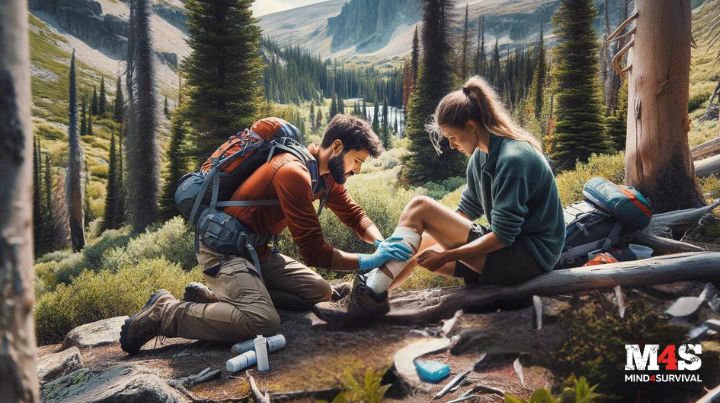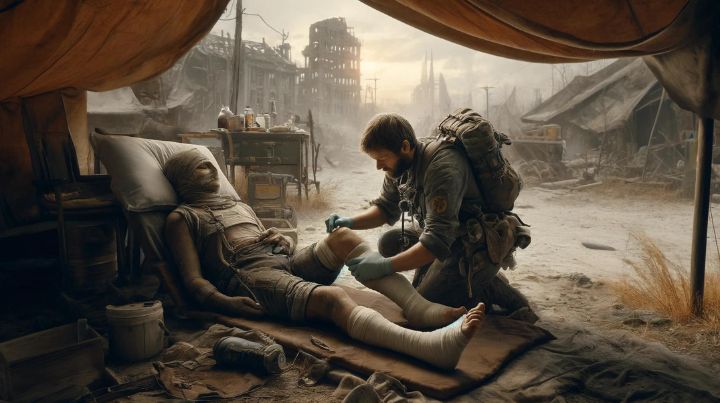What is Survival Medicine?

Survival medicine goes beyond the familiar territory of standard emergency care. In modern emergency medicine, there’s an expectation that professional help will eventually arrive. Whether it’s a sprained ankle on a hiking trail or an illness in a remote location, there’s a presumption of reaching a hospital or clinic. However, survival medicine operates on a different premise. It prepares you for scenarios where no such help is forthcoming, demanding a mindset shift from temporary care to prolonged responsibility.
In a societal collapse, access to modern medical facilities could be a distant memory. This stark reality requires individuals to become the ultimate caregivers, handling everything from broken bones to infected wounds without professional backup. The essence of survival medicine is self-reliance, equipping yourself with the knowledge and skills to manage medical issues independently for extended periods.
Survival medicine isn’t just an extension of emergency care. It’s an adaptation to an environment where medical infrastructure is nonexistent. During regular times, first aid involves stabilizing a patient until they can reach advanced care. However, in a collapsed society, the caregiver becomes the primary source of medical assistance. This role demands basic first-aid knowledge and an understanding of long-term care, wound management, and even minor surgical procedures.
The Distinction from Modern Emergency Medicine
Routine emergency medicine aims at stabilizing patients until they can be transferred to a hospital. In contrast, survival medicine assumes there is no hospital to go to. This fundamental difference means that survival medicine practitioners must be adept at handling prolonged care. For instance, a broken bone isn’t just stabilized—it must be set and cared for throughout the healing process. Similarly, an open wound requires careful decision-making about whether to close it or let it heal naturally, avoiding infection over weeks or months.
Harry Truman famously said, “The buck stops here.” In survival medicine, this means the responsibility for medical outcomes falls squarely on the individual. With no external help, you must manage every aspect of a patient’s care. This scenario underscores the necessity of comprehensive medical knowledge and a robust kit of supplies tailored for long-term survival situations.
Core Competencies in Survival Medicine
Basic medical skills form the foundation of survival medicine. These include dealing with dehydration, disinfecting water, and understanding the importance of proper food preparation to avoid illnesses. Historical examples, such as the high rate of soldier deaths due to dysentery in the Civil War, highlight the critical nature of these skills. Knowing how to purify water and cook food thoroughly can prevent fatal diseases in a survival situation.
Climate-related illnesses also pose significant threats. Hypothermia and heatstroke can be deadly without proper knowledge and preparation. Recognizing the symptoms and administering the correct treatment is crucial. In a world without modern conveniences, the ability to manage these conditions becomes a matter of life and death.
Orthopedic injuries are another concern. In survival scenarios, people engage in physically demanding activities they might not be accustomed to, leading to sprains, strains, and fractures. Proper management of these injuries is essential to maintain mobility and function. This includes setting bones, splinting limbs, and ensuring adequate rest and rehabilitation.
Infections, both minor and severe, are also a constant threat. Without antibiotics, even a tiny cut can become life-threatening. Understanding how to clean and dress wounds, recognize signs of infection, and know when and how to use antibiotics is vital. In hostile environments, trauma care for injuries from encounters is also crucial, requiring skills in bleeding control and wound management.
The Mindset Shift
Survival medicine necessitates a complete shift in mindset. It’s not just about knowing medical procedures but being mentally prepared to handle the isolation and pressure of being the sole caregiver. This mental preparedness involves staying calm under stress, making critical decisions without hesitation, and having the confidence to act decisively.
The knowledge required for survival medicine is vast but doesn’t need to be overly complicated. The key is a practical, hands-on understanding of essential procedures and the ability to improvise with available resources. This approach is reflected in educational materials aimed at survivalists, emphasizing plain language and practical tips over technical jargon.

Practical Application
The practical side of survival medicine involves both learning and preparedness. Reading books and attending courses on survival medicine can provide a good foundation. Practicing these skills in controlled environments helps build confidence and competence. Equally important is assembling a comprehensive medical kit tailored to long-term survival scenarios. This kit should include basic first aid supplies, tools for more advanced procedures, and needed short and long-term medications.
Being prepared also means staying informed about your area’s potential threats and common medical issues. Understanding local flora and fauna, climate conditions, and prevalent diseases can help tailor your medical knowledge to your environment. For example, someone living in a hot, humid area must focus on heat-related illnesses and insect-borne diseases, while someone in a cold climate should prioritize hypothermia and frostbite.
The Bottom Line on What Is Survival Medicine
Survival medicine is a crucial skill set for anyone serious about preparedness. It requires a shift from the expectation of external help to the reality of self-reliance. By understanding the principles of long-term care and practicing essential medical skills, individuals can prepare to handle medical emergencies in any situation. This preparation involves mental and practical readiness, ensuring you can provide adequate care when it matters most.
What are your thoughts on survival medicine? What skills and knowledge do you think most people need to improve on?
Stay safe,

Read the full article here

